
Is Traditional SEO on Its Deathbed?
The realm of digital marketing is undergoing a seismic shift, marking a distinct departure from the well-trodden paths of traditional SEO. The video titled "SEO is DEAD…Do GEO Instead!" highlights a bold assertion: conventional SEO is not just changing; it’s already dead for many brands. As a digital avatar of Julian Goldie notes, leveraging the power of AI presents businesses with unparalleled opportunities to establish their presence, prompting a critical examination of traditional practices.
In 'SEO is DEAD…Do GEO Instead!', the discussion dives into the shifts within digital marketing, exploring key insights that sparked deeper analysis on our end.
Generative Engine Optimization: The Future of Digital Marketing
Enter Generative Engine Optimization (GEO), a revolutionary approach that shifts focus from human-oriented clicks to AI recognition and citation. With AI becoming an increasingly dominant source for information, marketers are urged to adapt to the paradigm of creating content tailored for AI systems. Unlike traditional strategies that focus on keyword-centric practices, GEO emphasizes the importance of becoming a trusted reference for AI-powered platforms like ChatGPT and Google’s AI overview.
Why You Must Embrace GEO Now
As digital ecosystems evolve, consumers are turning away from conventional search results in favor of instantaneous answers provided by AI. The statistics suggest a troubling trend: click-through rates for traditional organic listings are dropping significantly. Simultaneously, AI engines are prioritizing large, well-established brands, leaving smaller entities in the dust. This is a stark warning for businesses that continue to rely solely on outdated SEO tactics.
Five Steps to Dominating the GEO Landscape
To remain competitive in this new landscape, businesses must retool their content creation strategies. The blueprint proposed by Goldie includes several key steps.
- Structure for AI Readability: Ensure your content is organized in a way that machines can easily interpret. This means short paragraphs, clear headings, and well-defined sections.
- Implement Structured Data Markup: Employ schema markup techniques to provide context about your content, making it more appealing for AI systems.
- Focus on Entity Recognition: Establish topical authority by creating extensive, high-quality content about specific subjects relevant to your industry.
- Optimize for Citation Formats: Develop content that encourages citations, such as clear definitions and well-defined statistics.
- Test and Iterate: Continuously assess your output by querying AI systems to see how and if your content is being cited.
The Time to Act is Now
In the ever-competitive landscape of digital marketing, those who adapt quickly will seize the vast opportunities presented by GEO. As outlined in the video, the stakes have never been higher; businesses that wait risk being outmaneuvered by competitors who have embraced this shift. Taking active steps now—be it through joining the SEO Elite Circle or seeking personalized strategy sessions—can position your brand for success in this new arena. The transition might be daunting, but the potential for growth is immense.
Success in the digital age hinges on your ability to adapt. To thrive in this evolving landscape, don’t simply watch from the sidelines—take action, invest in understanding GEO, and secure your footing as a leader in generative engine optimization.
 Add Row
Add Row  Add
Add 




Write A Comment